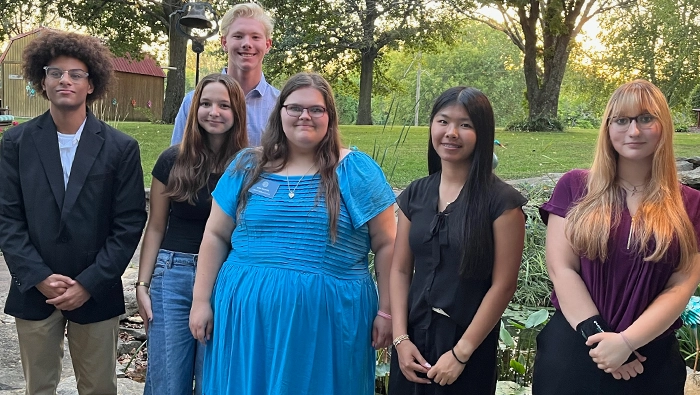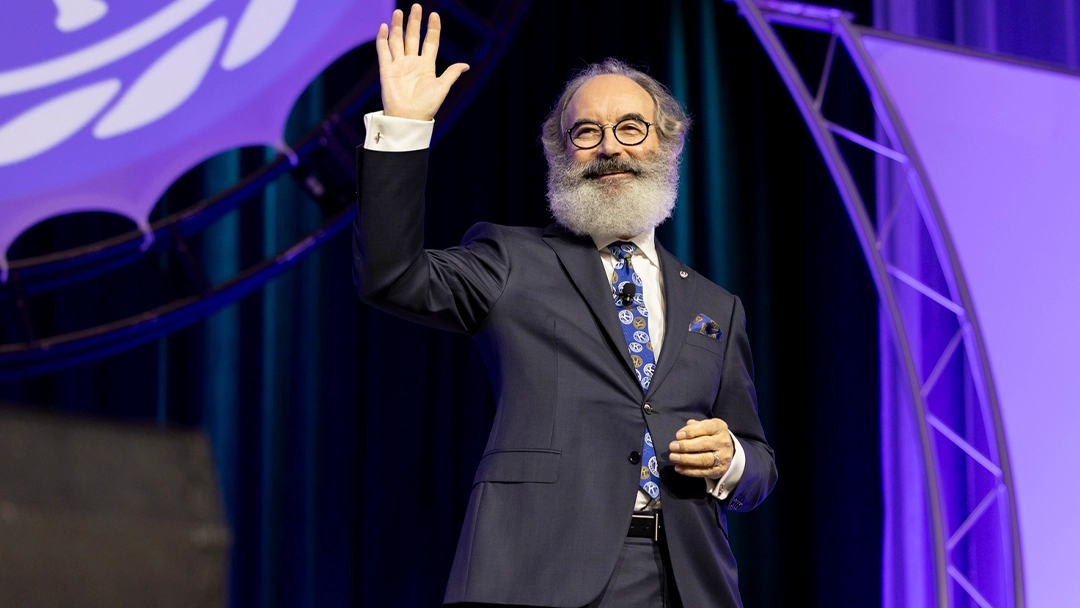
How a club gained a young leader
In a few years, Kimi Mason has gone from Key Club to Kiwanis club president.
By Tony Knoderer
There are many good reasons for a Kiwanis club to sponsor a Key Club. Here’s one of the best: Many members of Kiwanis International’s Service Leadership Program for teens eventually become Kiwanis club members after they graduate.
And then there are members like Kimi Mason (pictured, third from right), a recent Key Club alumna who is 2025-26 president of the Kiwanis Club of Liberty, Missouri, U.S.
Mason’s membership — and her Kiwanis club leadership — are not a matter of luck or random chance. The Liberty club works closely with the three area Key Clubs that it sponsors, as well as the faculty members who also serve as Key Club advisors. So it makes sense when those Key Clubbers remain interested in service and leadership after high school.
“My faculty advisor from high school, Wendy Sohm, invited me to a meeting,” Mason says. “She just said, ‘Hey, if you’re still interested in continuing your journey, check us out.’ And so I did.
“I still wanted to be involved, so I committed — and here I am.”
Keeping connections
Before graduating from Liberty North High School in 2021, Mason was the Key Club’s secretary as a sophomore and then its president in her junior and senior years. One of the Kiwanians who made Key Club a positive experience for her was Jim Major, whose support as the Kiwanis advisor showed her how important a Kiwanian’s presence can be — for both the Key Club and the Kiwanis club.
“Jim is really good about keeping us connected,” she says. “He always tried to come to all of our meetings and to relay information about what was going on with us to Kiwanis.”
That connection has continued into Mason’s Kiwanis membership. Five current members of the sponsored Key Clubs — from Liberty, Liberty North and Excelsior High Schools — were part of her installation ceremony as the Kiwanis club’s president. (See photo.)
“We have a pretty good, pretty strong relationship with them,” Mason says. “We involve them when we can, in things like our Liberty Fall Fest Parade and our annual pancake breakfast fundraiser. So usually at installation dinner he’ll invite kids from all three Key Clubs that we sponsor.”
A member and a mentor
Major has been supporting members of Kiwanis Youth Programs since 2012. After joining the Simi Valley Kiwanis Club in California, U.S., the year before, he started a K-Kids club and then became its Kiwanis advisor in 2013. In the following years, he also worked with the club’s sponsored Builders Club.
“In 2014 I was asked by our Simi Valley president, Don Sturt, to start working with the Key Clubs,” Major says. “I started working with both the Royal High and Simi Valley High Key Clubs, and soon after I was asked to help our Region 10 Advisor Stacie Marotta. I enjoyed this and the kids seemed to respond well to me.”
Major himself filled the role in 2015-16 when Marotta stepped down. When he retired from his career in aerospace manufacturing in 2017, he moved to Kearney, Missouri — and quickly got involved with Kiwanis and Key Club in his new state. Since Kearney didn’t have a Kiwanis club, he joined the Liberty club, as well as the Gladstone Kiwanis Club, and soon afterward he was mentoring Key Clubs again.
Of course, one of those mentored members was Mason. When she and Major reconnected as members of the Liberty Kiwanis club in 2023, her level of involvement was no surprise.
“Kimi became an active member right from the start,” Major says.
Becoming president within a couple years of joining the club has provided further evidence of something that many Kiwanians have discovered: Sometimes the busiest people make the most effective leaders. When the club’s previous president, Ashley Rivera, told her she’d be a good fit for the role, Mason was hesitant. A young adult who works as a classroom paraprofessional, she worried about the time commitment.
“If I can’t commit 100%, I feel like I can’t commit at all,” Mason says, “but that isn’t always the case. I just was afraid that I wasn’t going to be fully in, but it ended up working out just fine.”
Major adds: “Now it’s our job, as members, to support and mentor her in this next step in her growth.”
Letting them lead
For Major, one of the most gratifying aspects of being a Key Club advisor is watching young people like Mason grow. He also has learned a few things himself.
“You don’t build leaders by leading but by letting them lead,” he says. “This was taught to me before by a dear friend and school advisor at Simi Valley High School. Her words were: ‘You stand behind them, and when they come to that cliff and have one foot over the edge, you grab their collar and pull them back to safety.’ This has been my guiding principle since Day One.”
Now that Major and Mason are fellow Kiwanis members, they’re working together to support the next generation of leaders — and in some cases, future Kiwanis members.
“Kiwanis clubs show them that someone is always in their corner, ready to give an unbiased nudge when they need to take their next step,” Major says. “I feel truly blessed and honored to have the opportunity to touch the hearts and souls of so many of our future leaders on their journey to adulthood.”


